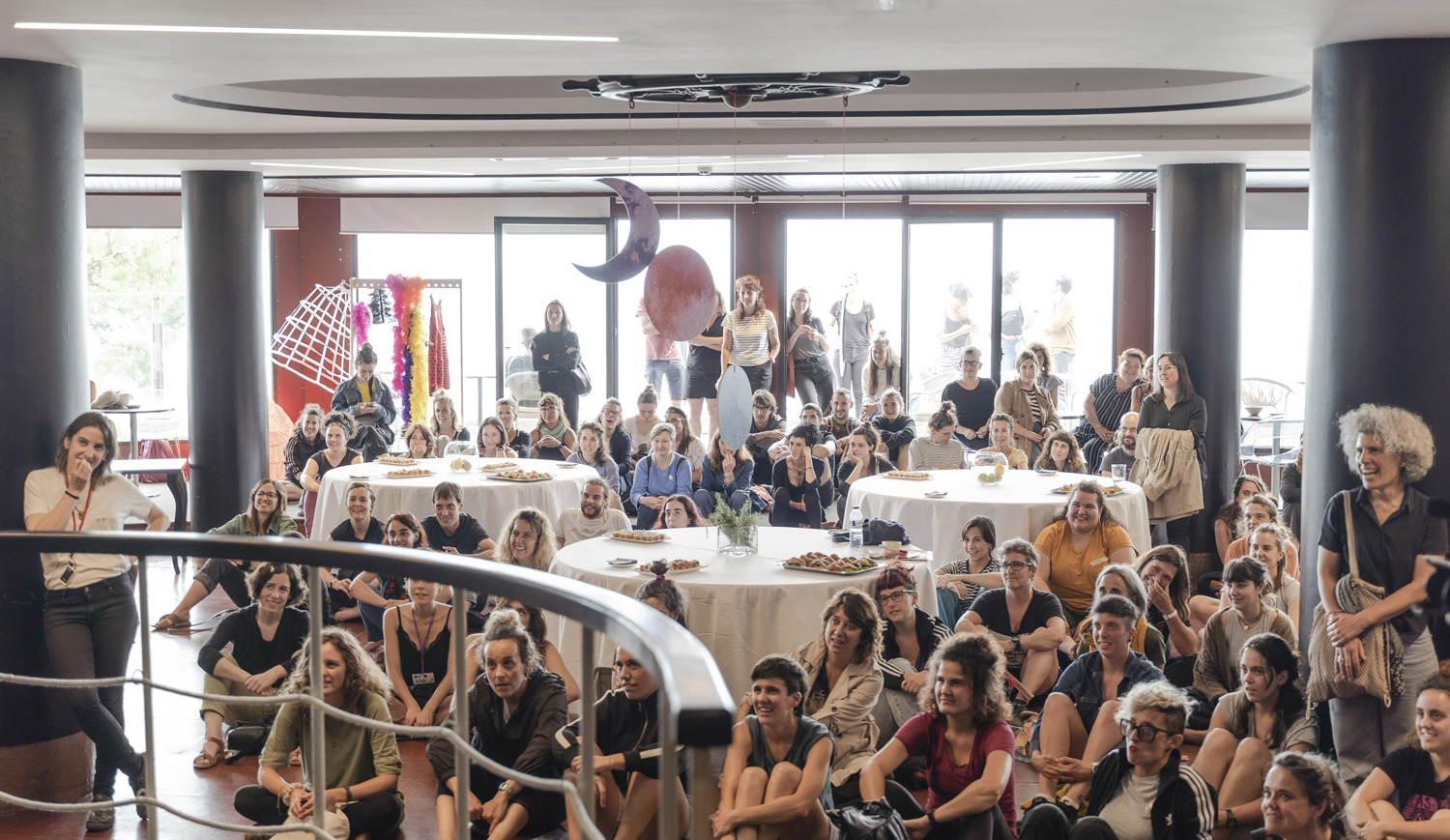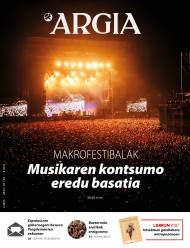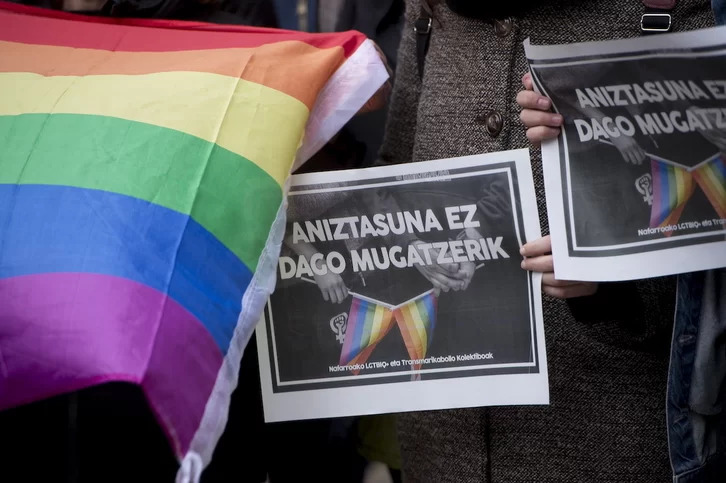Moving the corners to fly the erotic
- What are erotic? What is the place of the marginal erotic in the imagination? How to work erotic in schools and institutes? To these and many other questions have been answered by Eider Goiburu, Mentxu Arrieta and Elena Urko. The three are experts in sexuality and have talked about marginal erotic at the II Feminist Coeducation and Pedagogy Congress. Congress in Donostia.

Sexuality can be worked from many angles. From the erotic perspective, the interlocutors talk about the social imaginary of erotic, referents and sexual education. They have highlighted the need for feminist pedagogical processes at a congress organized by Sorginlo and Ikertze.
Urko works around the representation of dissident bodies. She is a sex educator in schools and works at BDSM school. He has also worked on the transfeminist and post-porn movement in Barcelona. Urko relates erotic with stimuli, that is, for him it is erotic that produces an image, smell or situation, pleasure or excitement. To broaden its definition, it highlights that pleasure can also extend to other areas of life, such as emotional, psychological and intellectual: “In a space like the present one it can feel an intellectual pleasure and turn this journey into an erotic space.”
Goiburu is a feminist, pedagogical doctor, social psychologist, sex educator, teacher, trainer, researcher and advisor. It currently acts as a bridge between the interventions and the academic field. He considers that erotic women have a direct relationship with pleasure and desire: “Erotic is the multiple and changing ways to connect with pleasure.”
He adds that only the system gives legitimacy to a concrete erotic: “Although we began to socialize ourselves in hegemonic erotic, many of us have dissident experiences. As we dismantle hegemony, individual erotic emerge.”
Mentxu Arrieta: "Control and repression are denying our sexuality because they hide, do not mention and deny some realities"
Doctor of Social Psychology, is a specialist in sexology and actor, among others, Arrieta. It has also analysed the beliefs and attitudes of young people regarding disabilities. He considers that the ciseheteropatriarchal, binary and sexist system makes a “large” collective out of this hegemonic model: “They make us believe that thick bodies, with scars and stretch marks and with functional diversity have no place in the system.”
He says that the erotic of people with disabilities has been left out of public and private spaces: “Control and repression are denying our sexuality because they hide, do not mention and deny some realities.”
He adds that denying the sexuality of people with disabilities is denying sexual rights: “The necessary physical capacity and the necessary heterosexuality help each other in the denial of the sexual rights and pleasures of people with functional diversity.”
Arrieta and Urko report the pathology of bodies that are not medically regulated. Consequently, Urko stresses that, according to medicine, the transacted and disabled bodies must be “modified”: “As our bodies have historically been rejected, we are told that our bodies are not worth. How will we approach sexuality if we are told our bodies are not legitimate?”
Arrieta stresses the
importance of the new imaginary making visible dissident realities against the hegemonic Iruditegi: “We have to change the narrative imaginary to change the social imaginary.” She adds that the infantilization of people with disabilities removes their legitimacy for sexuality: “We have the right to feel pleasure, to live sexuality, to want and to be desired.” However, he says that the right to be loved is made for “a few”: “They make us believe that we are not worthy of love and pleasure.”
Elena Urko: "It's hard to want what you don't see, so it's up to us to decide what we show and what we don't."
Urko has joined in this and added that alliances between dissident sex and disabled people are very important: “They have imagined us as monsters, as if we were something to hide, that open us up to being perverse and diverted.”
The view from which the contents emerge greatly influences the imaginary that is created, so as creative porn content has “a lot” concern: “It’s hard to want what you don’t see, so it’s up to us to decide what is shown and what isn’t.” She adds that they should analyze sexual practices to which they give legitimacy and to which they do not and why.
However, it believes that new creative content has been a major change in the last twenty years and that there are more and more referents. He believes that pornography is also being made to see lots of bodies and identities: “We have an ethically minded porn; furthermore, if you don’t feel represented on these pages, we invite you to roll together and we all decide what to roll.”
She quickly mentions sexual education resources such as Sex School – sex education –, Sexus – information and advice on sexuality – or Telebist AIDS – feminist sex education. Goiburu denounces the “great” lack of Basque resources: “We should do Basque post-porn from the marginal erotic.”
There is also talk about ways to transfer the
need for procedural interventions to the Sexual Education classrooms. Goiburu performs most of the interventions in schools and considers that there are two main lines of work. On the one hand, like the interlocutors, he considers that the essentiality is “necessary”: “We have to look for other references or we will continue reproducing what is up until now”. On the other hand, points out that sexual fantasies help break the rules that come from the system: “However, bringing sexual fantasies to a school is not generic.”
Goiburu has made a process to reflect on the situations in which Hiruki Larrox works with other agents and educators. They conclude that they feel “jumpers” or “firefighters”: “There is no process approach. They call us when there is a problem of violence to solve it as soon as possible, and there sexual fantasies and essentiality have no place”.
Eider Goiburu: "They call us when there is a problem of violence to solve it as soon as possible, and there sexual fantasies and essentiality have no place"
Besides being spontaneous, interventions usually take four, six or eight hours, making it difficult to create safe spaces: “We are asking for the body and intimacy to be at the center, and for this we need safe spaces. Today centers are not safe spaces, because they can judge what we can say or use against us.” To this end, it underlines the need to work the erotic through feminist pedagogies and perform procedural interventions.
She points out that intersectionality must be taken into account and that, despite being bodies or normative identities, the conference has also analyzed how educators can expand their essentiality: “The question that often arises is whether we have the legitimacy to talk about some issues, without being political subjects of it,” Goiburu said. It considers that this is not a question of legitimacy, but of responsibility: “My responsibility is to gather all the voices and leave room for them to take the space and put these issues on the table.”
In this sense, she believes that educators should be self-critical, as they behave embarrassingly. For example, a student denounces the educator's attitude when he said he was bisexual in an intervention: “The educator told him it was a phase. This comment, besides being bifobo, indicates that he was behaving sincerely. I don’t think that the experiences of a person of his age put him in question.” Therefore, it claims recognition of the status of political subject of children and adolescents: “They are the ones who know the most about their experiences and are able to understand, reflect and think.”
Young people start consuming pornography before, as porn is their only sex education. How on earth have we come here?
Today, it has to be acknowledged that thanks to the Internet it is much easier to see pornography. Unfortunately, through a click, the 7-9 year-old boy comes to... [+]
Zamora, late 10th century. On the banks of the Douro River and outside the city walls the church of Santiago de los Caballeros was built. The inside capitals of the church depict varied scenes with sexual content: an orgy, a naked woman holding the penis of a man… in the... [+]
























